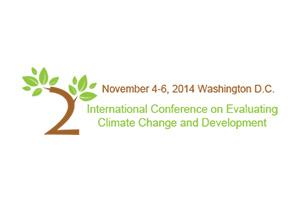2nd International Conference (2014)
The 2nd International Conference on Evaluating Climate Change and Development took place in Washington D.C. from November 4 to 6, 2014, with its main objective being promotion and interdisciplinary exchange of ideas and methods to evaluate climate change and sustainable development interventions. 300 participants from 59 countries participated in the event. They included professionals from international organizations, donor agencies, academia, private sector, NGOs and national governments.
This conference was organized by the Climate-Eval community of practice as follow-up to the very successful 1st International Conference on Evaluating Climate Change and Development, which took place in Alexandria, Egypt, in 2008. The 3-day conference included parallel sessions, panel discussions, and round-table sessions on the monitoring and evaluation related to climate change adaptation, mitigation and climate change policy interventions, with the participants not shying away from in-depth discussions on topics ranging from theory of (no) change approaches, institutional capacity development, disaster risk reduction and resilience, tracking adaptation, and the M&E of ecosystem-based and natural resource management interventions.
Please visit the agenda for a complete overview of all sessions that took place those three days.
A selection of key conference messages and links to Climate-Eval commissioned studies, which were presented in draft form during the conference, are shared below.
Key Messages
- The evaluation community has come a long way, but big challenges require still some changes.
- A variety of new and existing methods and concepts in evaluating climate change and development interventions were discussed, such as complexity theory, theory of no change, quasi-experimental methods, network analysis, innovative mixed-method approaches in adaptation, participatory data triangulation, and others.
- Big data is more readily available and accessible, but is not being used to the extent possible for evaluations at scale. Advances in geographic information sciences, remote sensing and crowd-/cloud-sourcing were cited as techniques that are currently transforming M&E at scale.
- Capacity and resources in developing economies to undertake data collection, conduct analysis, and inform policy-making by means of evaluative evidence still need further collaborative capacity development and support.
- There is more clarity on climate change adaptation M&E concepts such as adaptive capacity, transformative capacity, and adaptation mainstreaming, and some good M&E examples were shared. Risks and uncertainties in adaptation M&E need to be managed better, and climate change adaptation needs to be broken down in the context of other development challenges.
- Monitoring, reporting and verification (MRV) systems in mitigation still need to further mature when it comes to measuring good governance in mitigation and wider socio-economic benefits. Also, more coherence is needed at a global level on standard approaches to measuring emission reductions in order to guide investors and developing countries.
- There is an increased focus on ‘learning’ in evaluations and on beginning evaluation from the design stage to enable learning in a dynamic, evolutionary manner.
Climate-Eval Studies
The draft reports of two Climate-Eval commissioned studies were presented and more information on these studies can be found below:
- Good Practice Study on Principles for Indicator Development, Selection, and Use in Climate Change Adaptation Monitoring and Evaluation
- Scoping Study on Evaluation of Natural Resource Management Interventions linked to Climate Change
These studies are excellent examples of the work Climate-Eval is undertaking on substantive issues of importance to its members and the wider the evaluation community.
Next Steps
The conference proceedings will be published as an open source publication. Meanwhile, the Climate-Eval website will showcase learning material, including webinars, blogs, videos, and presentations. The objective of next steps is to ensure that conference findings are disseminated to as wide an audience as possible for maximum uptake in future work and dialogue.



